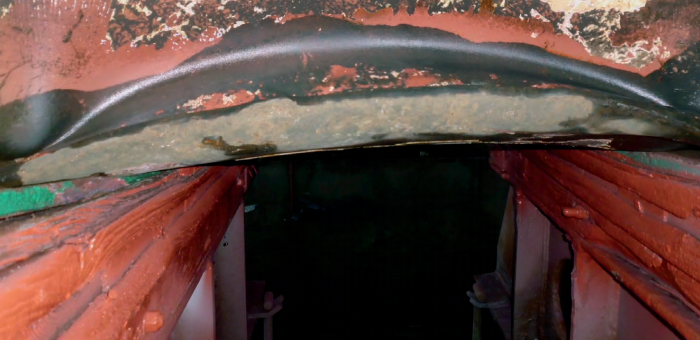UK MAIB in its latest Safety Digest, presents an incident where, because of bad weather a Ro-Ro cargo vessel decided to anchor to allow the weather front to pass through. The vessel anchored, but a little later, the second officer on watch on the bridge suspected that the anchor was dragging. The master turned on the engines, managing to stop the dragging, while with the help of a tug the vessel cleared away from dangerous rocks, which were approaching.
The incident
Due to bad weather, a Ro-Ro cargo vessel sailed from port and went to anchor to allow the weather front to pass through. The local pilot recommended a sheltered anchorage with good holding ground. The vessel anchored in the position recommended by the pilot, in 45m of water, using its port anchor with 8 shackles in the water.
[smlsubform prepend=”GET THE SAFETY4SEA IN YOUR INBOX!” showname=false emailtxt=”” emailholder=”Enter your email address” showsubmit=true submittxt=”Submit” jsthanks=false thankyou=”Thank you for subscribing to our mailing list”]
At night, the second officer on watch on the bridge suspected that the anchor was dragging. He called the master and the duty engineer telling the duty engineer that the engines and thruster were required as soon as possible. The master requested the assistance of a tug, and crew were sent to anchor stations.
On arrival on the bridge the master tried to turn the vessel to port using the bow thruster to counterbalance the effect of windage on the port side. The anchor cable was leading abaft the port beam with very heavy weight. However, the bow thruster did not have enough power to turn the vessel, and the windlass could not recover the cable.
An hour later, control of the engines was passed to the bridge. The engines and thruster were used to bring the stern of the ship into the wind, successfully reducing the windage. This manoeuvre stopped the vessel dragging, but the close proximity of charted rocks meant that it was unsafe to recover the anchor.
While the master avoided the rocks, the vessel’s stern grounded on a shoal. All tanks were sounded and there was no damage. The echo sounder was indicating 21m under the vessel’s bow.
A tug then arrived and began pushing the vessel away from the rocks. As the weight came off the anchor cable, it was heaved in, and the vessel was able to proceed to a place of safety.
Probable cause
An inspection identified indentation of the bottom plates in way of the engine room. There was no water ingress and the vessel was able to sail to its next port, where a dive survey took place.
- While the pilot recommended a suitable sheltered anchorage, his recommendation was based on anchoring ships with significantly less windage. When planning any anchorage, particularly with bad weather forecast, it is imperative to allow sufficient sea room. The anchorage position should be sufficiently far from charted hazards to allow time to deal with a situation should the anchor begin to drag. The master did not consider the possibility of the vessel experiencing stronger winds than those forecast, which was the case in this incident. A higher wind speed increased the potential for the vessel to drag its anchor. The International Chamber of Shipping’s Bridge Procedures Guide, Chapter 2.4.10 provides guidance on planning an anchorage.
- The Nautical Institute publication entitled ‘Mooring and Anchoring Ships – Principles and Practice’ provides detailed information regarding anchoring operations. It references assumed worst conditions for vessels at anchor, discusses methods of anchoring, and suggests considerations for deciding the amount of anchor cable to deploy. A commonly used formula for calculating the minimum number of shackles of anchor cable to deploy is 1.5 x square root of the water depth (measured in metres). In this case the ship deployed 8 shackles of anchor cable in 45m of water. Based on the above guidance, particularly in view of the poor weather forecast and the ship’s significant windage, at least 10 shackles of anchor cable should have been deployed. Alternatively, the master could have opted not to anchor but to instead proceed to sea.
- When the vessel was anchored, the engine room was usually operated as an unmanned machinery space (UMS). In this case, due to the proximity of hazards and the poor weather forecast it would have been prudent to keep the engine room manned overnight. The decision to allow the engine room to operate in the UMS mode overnight led to a delay in the engines and thruster being made available to the bridge when they were needed.
- The importance of keeping an effective bridge anchor watch is often overlooked. In this case, the second officer who was on watch suspected that the vessel was dragging anchor and alerted the master and woke the duty engineer before the GPS anchor watch alarm had sounded. His prompt actions ultimately prevented a deteriorating situation developing further.































































